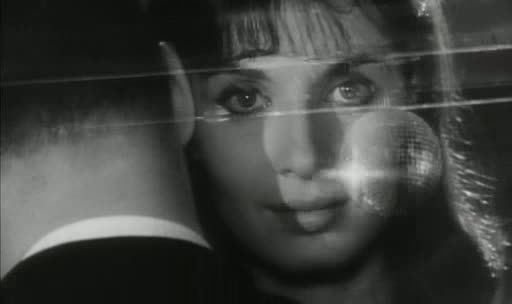
In the light of his death last week, I finally got around to watching Claude Chabrol's Les Bonnes Femmes (1960). Just as advertised (by various Obit. and Appreciation writers), LBF's a great film - ingenious, frightening, maddeningly elusive but also unbearably direct, unforgettable. It seems obvious in retrospect that LBF is an important influence (directly or indirectly) on the intellectual 'shock' cinema that stretches from Haneke to directors such as Noe and Breillat.
I'll need to think the film over a lot more to be sure, but, right off the bat, LBF appears to fit beautifully with Psycho and Peeping Tom as a panel in a 1960 horror triptych about men and women as largely, mutually uncomprehending, alien species (though distance from self or self-incomprehension is also important in these films) in something like a state of war, or, perhaps better, a parasite-host symbiosis or a zoo-animal/-keeper relation. The last is the key, cruel suggestion of the terrific zoo scene in LBF (although the audience isn't in a position to decipher that suggestion properly as it's made, i.e., first time through[1]). [Update: I used to have a clip of the scene here, but it's been removed from youtube, so a couple of images will have to do.]:


P, PT, and LBF all argue that only various sorts of social norms and self-delusions prevent the horrifying facts about ourselves from being obvious to all concerned. LBF's coda flags explicitly that those self-delusions can include novel and film conventions and expectations about romantic heroines and pretty Parisiennes in particular, i.e., factors that have shaped and distorted our view of the film we've just been watching. On the one hand, that coda practically demands that the audience rewatch LBF immediately (I immediately rewatched about half). On the other hand, some viewers will inevitably react angrily to this sort of meta-manoeuver, resent that Chabrol has so manipulated them, and so on. Indeed, LBF was a financial and critical failure in 1960 (according to imdb, it led some Parisian viewers to break their cinema seats), and it wasn't released in the US (in NYC) until 1966. At least LBF didn't effectively end Chabrol's career in his home-industry the way PT did Powell's.
LBF is dee-pressing, and brilliantly nasty, albeit in a way that's fairly familiar to us these days from Haneke, Breillat, et al.. But Chabrol got there first, in something like the way Hitchcock did with Psycho. 1960-vintage Chabrol and Hitchcock was quickly out-stripped in the explicit sex and violence stakes by imitators and acolytes, and by the directors' own later selves (some contemporary viewers may be incredulous at LBF's pre-film, R-18 certificate -'Ce Film est interdit aux moins de 18 ans'). But both P and LBF are such artful and pure examples of the film sub-genres they founded that they're hard to improve upon in any case, and the subsequent jading of our palates in fact only makes them more watchable now.[2]
LBF wobbles slightly and almost falls over first time through (at about the half-way point in my case). We flail and lose patience as we're left suspended, not knowing how to understand/read what we're seeing. That's risky, but Chabrol's risk-taking pays off big time by the end of the film, and on subsequent viewings. Les Bonnes Femmes is a masterpiece, probably the original brainy, malevolent masterpiece.
[1] Indeed, first time though we're tempted to exactly the wrong (or at best strictly one-sided) analogy: biker guy is like the caged animal. Some reviewers, apparently eager to demonstrate their superiority to Chabrol's relatively open-textured film, overlook this and falsify which conclusions LBF allows anyone to draw, as it were, in real time, e.g., Mick LaSalle's intemperate remark: "The women go to the zoo and see a lot of beautiful animals in cages. We get the analogy. The gals don't." But, as we've seen, LBF initially, principally signals that the biker guy is (perhaps guys in general are) the caged animal. That is, this important scene, like others in LBF, opens up multiple meanings, and an alert audience has no choice but to try to juggle these partially competing ideas (keep them all aloft) as the film unfolds and springs its traps. Taxing the audience in this way is a signature of a certain sort of potentially great film-making, albeit a sort that's not to everyone's taste (e.g., some people simply dislike all demanding films). At any rate, LaSalle's dismissive yawn at LBF is quite unwarranted. It's also very revealing. One of Chabrol's most famous films, Les Biches (1968), explicitly asks 'Who's the hunter, and who's the hunted?'-type questions. A reviewer for a major metropolitan paper in 2000 should have been able to be sensitive to and non-reductive about different possibilities from Chabrol.
[2] Modern audiences have to work a little bit to appreciate P's and LBF's original 'hot stuff'/scandalous sides. The upside of that distance, however, is that it takes the edge off the films' contents and makes them more acceptable and accessible to broad audiences than before. Hard-R '70s films and their indie/foreign extreme successors today, by way of contrast, remain beyond the pale for many people. It's just a fact that Looking for Funny Games with Mr Straw Dogs Irreversible Goodbar rarely comes to a multiplex or a dvd-player anywhere near most of us.
No comments:
Post a Comment